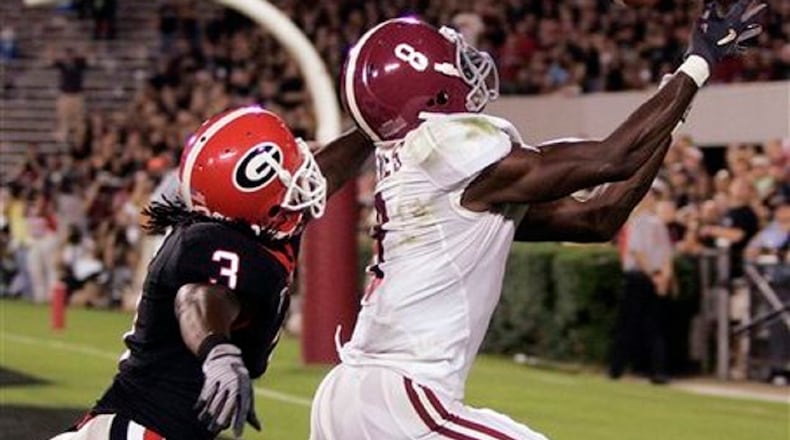There was even a petrol panic. Remember the cars lined up at gas stations along the way to Sanford Stadium? Maybe you’ve forgotten. If you’re a Georgia fan, you’ve tried to forget everything about that weekend.
Sept. 27, 2008: Alabama, ranked No. 8 in Year 2 under Nick Saban, arrived in Athens to face the 4-0 Bulldogs, who had slid to No. 3 after opening the season No. 1. Georgia had spent the second half of the 2007 season wearing its emotions on its shoulder pads — the penalized Gator Stomp in Jacksonville, the uproarious Blackout against Auburn, black shirts again in the Sugar Bowl rout of Hawaii — and was hoping color scheme would have a similar effect on the Crimson Tide.
The halftime score: Alabama 31, Georgia 0.
Today we recall that astonishing night as a tectonic shift. Alabama would win 41-30 and play for the 2008 SEC championship and, from 2009 through 2014, claim three BCS titles and three conference crowns. Georgia’s moment never quite arrived and still hasn’t. Before the Blackout Night, Mark Richt’s teams had won 80 percent of their games; they’ve won 68.8 percent since. (Still good. Just not as.)
The teams have met once since, that for the 2012 SEC title. The Bulldogs came close to unhorsing Alabama and advancing to play Notre Dame for the national championship. (Bama would beat the Irish 42-14.) Aaron Murray’s final fling was tipped by C.J. Mosley into the hands of receiver Chris Conley, who fell on the 5-yard line as time expired.
For Georgia, the hairbreadth loss in the Dome lingers as a sad but proud moment. The Blackout Night of 2008 remains among its most crushing losses. The Bulldogs will face Alabama on Saturday and are favored, which is history in itself. Bama was last an underdog against Florida in the 2009 SEC championship, 72 games ago. That marked the longest run of favoritism in collegiate annals.
Some have declared that Bama’s reign is, ahem, out of gas. It didn’t play for either of the past two national titles — by Tide standards, a drought — and the home loss to Ole Miss was the shock of the young season. It has been said, with some justification, that the program famed for its recruiting lacks both a quarterback and a difference-making receiver. It has also been whispered that Saban’s blood-and-thunder mentality has been rendered stodgy in this hurry-up era.
In the visitors' locker room at AT&T Stadium on Sunday, one man rose to Alabama's defense. That man: Julio Jones, who plays for the Falcons and is the NFL's best receiver.
Then a freshman, Jones was one of many shining Tide lights on Blackout Night. He caught five passes for 94 yards and overshadowed Georgia’s A.J. Green, his contemporary in age and reputation. Jones’ 22-yard touchdown reception pushed the score to 31-0, marking the biggest deficit any Richt team had faced.
“We knew what we could do,” Jones said. “With Coach Saban’s mindset, it doesn’t matter where you are. Our mindset was that we were going to make all those people sit on their hands.”
That Bama team was strewn with luminaries, from Jones to tailback Glen Coffee to the mountainous defender Terrence Cody. Eight Tide players would become Round 1 draftees. Mark Ingram, then Coffee’s understudy, would win the 2009 Heisman. “The group we had was special,” Jones said. “But this group can be special, too.”
Really? After losing to Ole Miss? Now facing the possibility of College Football Playoff elimination three days into October? “They can’t get caught up in external factors,” Jones said. “They have to make Athens home for them.”
Then this: “It didn’t matter what anyone else thought of us. It only mattered what we thought of ourselves.”
There are those who believe this trip to Athens, Bama’s first since Blackout Night 2008, will bookend the Tide’s grand run under Saban. The game seven years ago trumpeted his program’s arrival on the national scene; a loss Saturday will be viewed as an abdication.
Against that ominous backdrop, let the record reflect that one prominent alum still believes in Bama. And the great Julio Jones hasn’t gotten much wrong lately.
About the Author
Keep Reading
The Latest
Featured


